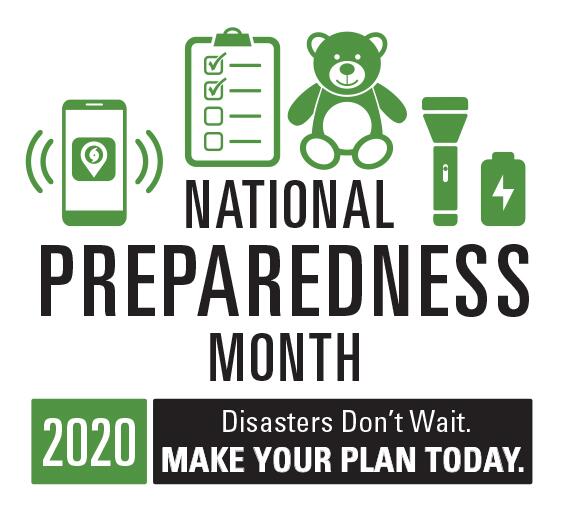
Disasters Don’t Wait. Make Your Plan Today
SPRINGFIELD – National Preparedness Month is recognized each September to promote family and community disaster and emergency planning. As we learned this spring with the COVID-19 pandemic, disasters don’t wait. They can strike at anytime and anywhere. The Illinois Emergency Management Agency (IEMA), and local emergency managers, are encouraging Illinoisans to take time to prepare for potential emergencies at homes, at work, and in the community.
“The ongoing battle against COVID-19 underscores the importance of building a culture of preparedness,” said IEMA Director Alicia Tate-Nadeau. “Now is a good time to take the lessons learned from the spring, when COVID turned our world upside down, and build an appropriate disaster plan that meets the needs of your family. Preparedness is more than building a kit, it’s about communication, mitigation and education. While being prepared will not prevent a disaster, it will provide the foundation for an expedited recovery and instill the confidence to meet challenges when they arise.”
This month, residents are encouraged to consider COVID-19 guidelines when evaluating and improving their family emergency plan. Some things to consider include:
• Make a Plan for When a Disaster Strikes: Your family may not be together if a disaster strikes, so it is important to know which types of disasters (tornadoes, floods, earthquakes, ect) could affect your area, and know how you will contact one another or reconnect if separated. How will your family adjust its routine should a member of your family require quarantine or isolation due to COVID-19? Plan today for different scenarios that could impact your work, school or family routine.
• Build a Kit: Once a disaster strikes, you will not have time to shop or search for supplies, so it’s important to have supplies pre-assembled. A kit should contain basic survival items necessary during an emergency, such as food, water, weather radio, batteries, medication, supplies for each member of your family. It is also recommended that you include face masks, hand sanitizer and disinfecting wipes in your emergency supply kit to address the current COVID-19 environment. Because a disaster can strike anywhere, Emergency kits should be kept at home, at work and in your car.
• Prepare for Disasters: Practicing tornado drills and fire drills aren’t just for school. Walking through this procedure at home with your family, and at work with your co-workers, is a great way to prepare for a disaster. As it pertains to COVID-19, take time now to prepare a quarantine space in your home. Quarantine helps prevent the spread of disease if someone has been infected with the virus without feeling symptoms. People in quarantine should stay home, separate themselves from others, monitor their heath and follow directions from their local health department. Additionally, it is recommended that you keep a two-week supply of groceries on hand to aid in a successful quarantine.
• Teach Youth how to Prepare for Disasters: Disaster planning, response, and recovery efforts should take into account the unique needs of children, who make up roughly a quarter of the U.S. population. Get kids involved in building their own emergency kit. Make sure to include your child’s favorite stuffed animals, board games, books or music in their emergency kit to comfort them in a disaster. Ready Kids website has a variety of tools and information that can be incorporated into lesson planning for educators statewide.
IEMA offers disaster preparedness information on the Ready Illinois website (www.Ready.Illinois.gov), a one-stop resource for detailed information about what to do before, during and after disasters. During large-scale disasters, IEMA uses the Ready Illinois website, Facebook and Twitter pages to provide critical information about the incident, including shelter locations, road closures, safety information, photos and more.
For more information about emergency and disaster preparedness, visit ready.illinois.gov.













